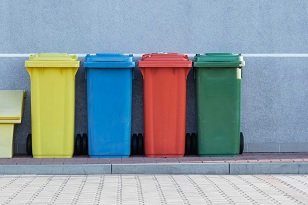How does a compost bin work? You need to find out! Composting is a great way to use food scraps and other organic materials on your property, but it can be confusing if you’re not sure how a compost bin works.
In this guide, we’ll explain everything you need to know about using outdoor compost bins and indoor compost bins. We’ll also show you how to make your own homemade compost in an outdoor bin or indoor container.
What Is Compost?
Compost is an organic material that has been broken down by microorganisms and the soil environment. The end result of decomposition is a mixture of nutrients, water and air.
You can use compost as fertilizer in your garden or lawn to improve growth. It also helps to prevent diseases such as fungal infections on plants when added to the soil before planting seeds or seedlings.
What Can I Put in a Compost Bin?
You can put leaves, grass, kitchen scraps, plant trimmings, coffee grounds and eggshells in your compost bin. Avoid meat, fish and dairy products as they will attract pests to the compost bin.
Avoid non-organic produce such as fruit & veg that aren’t grown organically or food items that are not local to where you live (for example if you’re from California but want to use someone else’s organic food waste). Organic material will also attract pests so avoid using this as well!
Avoid toxic materials like paint & pesticides because these are not good for your plants. Most especially if they end up in your garden after you’ve dumped them into a landfill site! Just learn how does a compost bin work, then you can get to worry about what to put in it later.
How Does a Compost Bin Work?
Composting is a natural process that happens when you put organic material like leaves and grass clippings into the ground. The bacteria in your soil convert these materials into compost, which can then be used as fertilizer for your plants.
Composting does not require any special equipment or tools to be successful; all you need is some dirt, water and time! However there are some things that can help make sure you do them effectively.
Make sure the compost pile has enough air circulation so it doesn’t get too hot or too cold (A good way is by adding an open top).
This will prevent mold growth which could kill off beneficial insects like bees that pollinate flowers near gardens soils where food crops grow healthy due in part because they receive free fertilizer from manure produced by livestock raised on farms.
Is It Better to Use an Outdoor or Indoor Compost Bin?
If you want to compost in your backyard, an outdoor bin is the way to go. Outdoor bins are better for the environment because they don’t generate heat or emit odors. Manufacturers normally make them out of wood, metal or plastic and come with various features like wheels to make it easier to move around when full.
The main benefit of an indoor composting system is convenience: You won’t have to haul away trash cans full of waste every time you need one! Indoor bins usually cost more than outdoor ones because they’re more complex (they require ventilation), but they will save money over time by reducing landfill waste and recycling food scraps into fertilizer instead. How does a compost bin work? That’s the first thing to know before making a decision.
How Do You Make Compost for Your Garden?
Compost is a rich source of nutrients for your plants and soil. It’s important to make sure you have the right balance of materials, so here are some tips on how to make compost:
Add nitrogen-rich materials (like kitchen scraps) to the compost pile. These will help speed up decomposition and turn it into black gold!
Turn the pile regularly—at least once every week or two. To mix up the decomposing material as evenly as possible throughout all layers of your composting box or bin.
Advantages and disadvantages of using a compost bin
Composting is one of the most important things you can do to help the environment and your garden. Composting allows you to recycle organic matter into valuable fertilizer for plants and soil, so it’s a win-win for both you and Mother Earth. But there are many different types of compost bins on the market today, which can make it worth your while to research before buying one. Here are some advantages and disadvantages of using these different kinds of bins:
If you’re worried about smells or attracting pests, a compost bin may be better for you.
If you’re worried about smells or attracting pests, a compost bin may be better for you. Compost bins are off from the outside world, so they don’t need to be open and exposed like an open pile. This can be helpful if there are concerns about attracting insects or rodents that could contaminate your compost materials.
For further research about waste management services be sure to head over to WM Waste Management Services.
Another advantage of using a compost bin is that it’s easier to seal off than an open pile because the lid stops any wind from blowing through it. And this helps keep moisture inside the container instead of leaking out into your yard or garden area where it can cause problems with plants and animals around them.
It’s contained, so it keeps organic matter from being exposed to the elements
A compost bin is an enclosed container, which keeps organic matter from being exposed to the elements. This can be helpful for keeping smells in and pests out. It also keeps the composting process contained.
When you’re using a traditional pile system with sawdust or grass clippings as your base material and adding kitchen scraps like tomato skins and onion peels later on, there’s always the possibility that something will fall through the cracks and end up on the ground outside your backyard. This can lead to unsightly messes of rotting food scraps attracting insects who may then turn them into their own buffet tables (or worse).
With an enclosed system like this one where all materials are kept inside until they’ve been accepted as ready-made compost by soil microorganisms living below ground level.
And thus not exposed to windy conditions. There won’t be any leftovers sitting around waiting for someone else’s dog or cat (or raccoon)to come along looking at what they think might be tasty treats! How does a compost bin work is quite an important process?
Easy to move around, especially if you’re making holes in the bottom
If you’re using a compost bin, it’s easy to move around. For example, if you want to move your compost bin and make holes in the bottom so that air can flow through it more easily, then all you have to do is remove the lid and put it on top of whatever container will be holding your product.
Another advantage of using a compost bin is that there’s no need for some kind of specialized tool. Just use something like a shovel or trowel with which any ordinary person could accomplish their task just fine! This makes them ideal for those who doesn’t have experience with tools but still want quality results from their efforts at gardening or farming as well (and maybe even home brewing).
You might not get enough oxygen in your compost, leading to decomposition instead of composting
When you put food waste into a compost bin, it needs to be broken down by microorganisms. These microbes use oxygen from the air to break down the organic matter in your waste so that it can be used by plants or other organisms like worms and insects.
If there isn’t enough oxygen available for these microbes to do their job, they won’t be able to break everything down properly and will end up rotting instead! This leads us back towards anaerobic conditions—which is bad because we want our ecosystems as sustainable as possible!
If a compost bin is too small, you may have to buy more than one over time
If a compost bin is too small, you may have to buy more than one over time. Some people think that they can compost everything in one bin, but this is not the case. In order for your kitchen waste to decompose properly and you can use it as fertilizer for plants or flowers. You need to mix it with other materials like straw and sawdust so that it doesn’t smell too strongly of animal manure (which smells bad).
The best way to prevent this problem is by choosing an appropriate size compost bin that’s big enough for all of your household waste.
If a compost bin is too big, it may be harder to move around and turn.
If you are trying to compost, it’s important to make sure that your compost bin is large enough. A large composting bin can be difficult to move around or turn. You may need a wheeled cart in order to move the contents of your composting area. It is important that the size of your material handling system is appropriate for what you are trying to do with them (i.e., how much space will be needed).
Frequently Asked Questions:
What is a compost bin, and why is it important?
A compost bin is a container used to decompose organic materials into nutrient-rich compost. It’s important because it helps reduce waste, enriches soil, and supports sustainable gardening and farming practices.
How does a compost bin work?
A compost bin works by providing the ideal environment for microorganisms (like bacteria and fungi) to break down organic matter. These microorganisms need the right balance of oxygen, moisture, carbon-rich (browns), and nitrogen-rich (greens) materials to thrive and turn organic waste into compost.
What can I put into a compost bin?
You can put a wide range of organic materials into a compost bin, including fruit and vegetable scraps, coffee grounds, eggshells, yard waste (leaves, grass clippings), small amounts of paper and cardboard, and more.
What should I avoid adding to a compost bin?
Avoid adding meat, dairy, oily foods, diseased plants, pet waste, and non-biodegradable items like plastics, metals, and synthetic chemicals.
How long does it take for a compost bin to produce usable compost?
The time it takes to produce compost varies but generally ranges from several months to a year. Factors like temperature, moisture, and the mix of materials can influence the composting process.
Conclusion
How does a compost bin work? To sum up, the compost bin is a great way to break down organic matter. The best part about it is that you can use any organic material, including yard waste and food scraps. So if you have a garden or an outdoor space that needs some extra attention before planting season arrives, this might be your solution. Looking to Gain Youtube Subscribers via purchase? Check out this link for more information!



